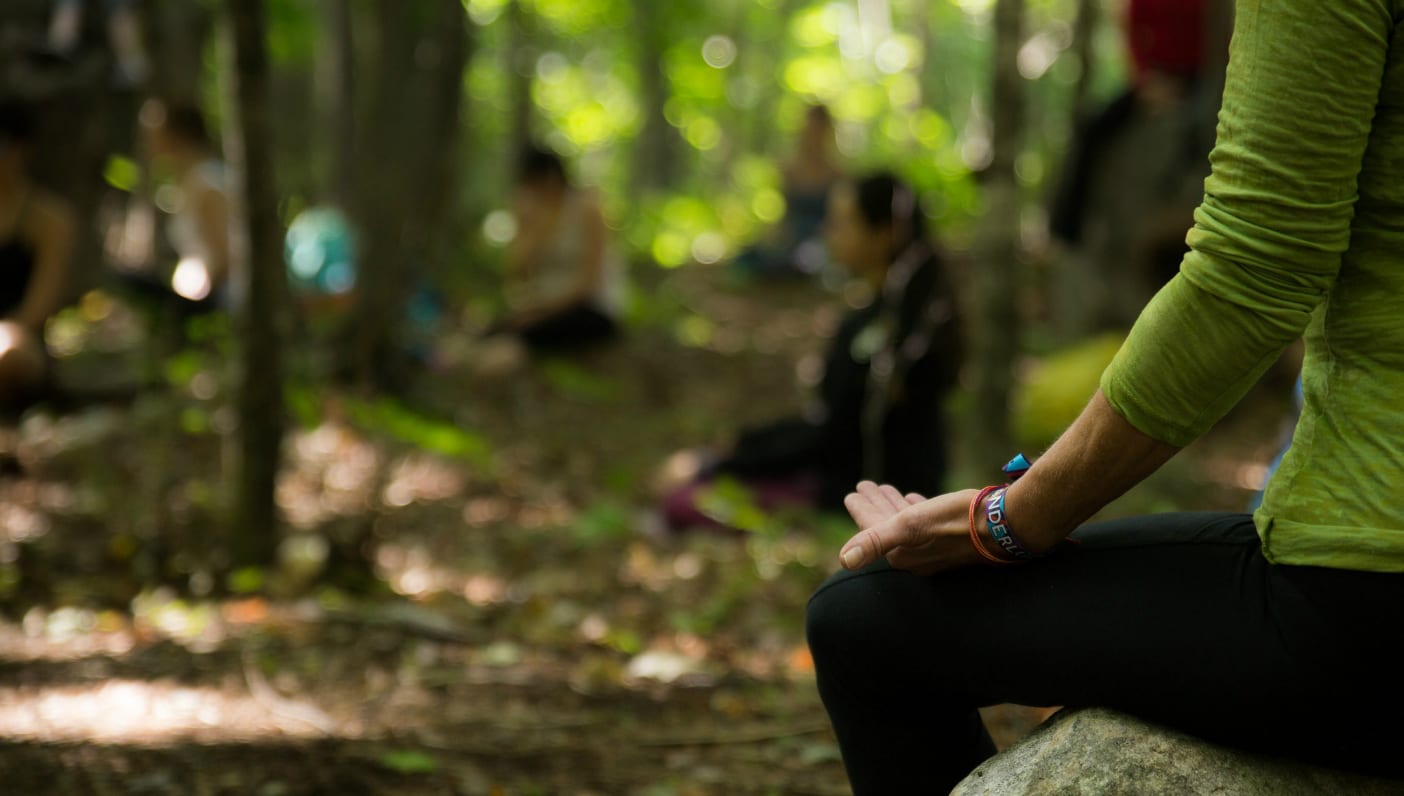
Davidji and Erica Jago both lead meditation workshops at Wanderlust O’ahu in March this year. You can practice with Davidji at Wanderlust Snowshoe in June or try group meditation at any Wanderlust 108.
In our yoga practices, we are striving for the union, or yoking, of our minds and bodies. Whether our yoga practice is an asana practice, which is most common, a pranayama practice, a practice of non-violence (ahimsa), sacred study (svadhyaya), or devotion (bhakti)—or any of the many ways we can practice yoga—the outer expression may look different, but the inner goal is the same: Union of the body and mind.
Yoga.
The goal of our meditation practice is the same: To yoke the mind and body, not to stop ourselves from having thoughts. Davidji, a senior meditation teacher and former dean at Chopra Center University, says, “If we’re having thoughts, it means we’re alive.” There are many different meditation techniques in which to achieve union with our thoughts, and it’s important to find the one that works best for you (Hint: It will be different for almost everyone). Davidji tried several methods before finding a few favorites: Today he practices a birth star meditation in the morning and afternoon, as well as a metta, or loving-kindness, meditation.
One of the common obstacles to meditation is that we often find ourselves going at it alone, with only books or online guides to aid us in our search for steadiness. If we do find meditation in a group setting, it’s probably for an all-too-brief few minutes before or after an asana practice.
What if meditation were practiced as a group, with guides, support, and satsang (community)—with all the benefits of an asana class, for example? Could the experience of union—of yoga—be felt even more strongly?
Group meditation has many benefits for every level of practitioner. You may find the practice of meditating with a group is beneficial once in awhile, or it may be something you like to do more often. How often you choose to join a group is up to you, but the benefits are too great to miss out on.
You will feel a sense of harmony.
When people practice meditation together, they are each entering into a peaceful state. They may be doing this separately, in their minds, but the energy that is created in the room is palpable. You can feel a sense of calmness and steadiness that they are emitting through their meditation. Erica Jago, a senior meditation teacher, has found that in her experience, “When connecting collectively (in group meditation), it’s not uncommon for people to leave group meditation and feel a strong intention for world peace.”
Your feelings of empathy will increase.
When humans participate in something together, they are more likely to feel a sense of empathy with each other. When they are meditating together, they can feel and understand what the others in the group are going through. They understand their similar experiences, frustrations, and goals. When we can put ourselves in the mindset of others, we are able to feel more compassion for their experiences, and our connection with humanity in general deepens.
The group will support your practice.
When you are meditating alone, it may feel easier to quit or give up if you’re having a rough day in your practice (and who hasn’t?). In a group, you can tap into that group empathy and know that everyone has been exactly where you are. You can float on the waves of their peace and steadiness while you find your own meditation groove (or you can just sit quietly). After the practice is finished, you can discuss with other practitioners your frustrations (or your triumphs) and ask for their guidance. Either way, you’re not alone.
You’ll be less likely to give up.
We know meditation has tons of benefits, but it isn’t always easy. Having a group hold you accountable for your practice makes you that much less likely to throw in the towel (or the cushion, as it were). As Davidji says, “In a group, people are able to cut themselves slack and be a bit more gentle (on themselves and each other). You receive the benefit of the group providing loving and subtle peer encouragement.”
You’ll make friends in high places.
You are who you hang with, as they say. The people that you spend time with largely determine how you spend that time: If you’re hanging out with people who like to meditate, chances are that you’re going to be pursuing a mindful lifestyle. You’ll bond over your meditation practice. Who knows—maybe you’ll even go on a meditation retreat together.
Regardless of how or why you meditate, you will find benefits like these—and more—from meditating in a group. We all struggle to fit our practices into our busy days, and having a group to support us not only makes us accountable to them—and to ourselves—but is there for us when we need reminding why meditation is good for us. In a meditation group, they are there for us—but we are also there for the group, reinforcing the satsang (community).
On a final note, Davidji reminds us, “There’s not such thing as a bad meditation—except the one you don’t show up for.”
—
Kristin Diversi is a star-child. A unicorn/monkey hybrid, she spends her days hopscotching dreams and moonbeams. After graduating magna cum laude with a BA in History and an MS in Nutrition, she delighted her parents and the student loan companies by deciding to follow her heart and do absolutely nothing related to any of her degrees. Currently pursuing a 500-hour certification, she was a yogini before yoga was cool. She is deeply flawed and terribly whimsical. Dream big. Be bigger.
